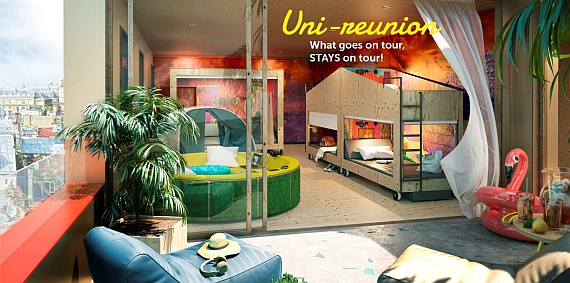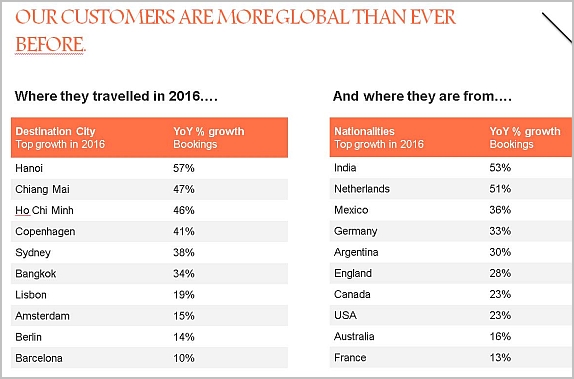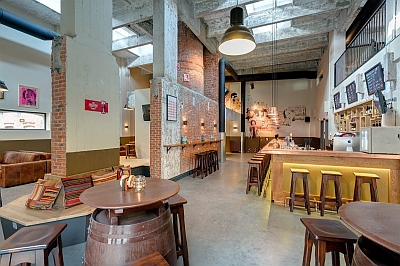ITB Hospitality Day Talk 2017: Hostel experts about the new colorful feeling
 |
| Born in the lab: bedroom of AccorHotels' new hostel brand Jo&Joe. |
Berlin (March 17, 2017). Let's meet at the neighboring hostel for a nightcap? For some residents, this has become part of normal life. "Hostels are fun. They are tasty, colorful, social, central, unique, and fantastic," just to mention some of the buzz words used in the image film of the Hostelworld Group at the 12th "ITB Hospitality Day" last Thursday in Berlin. The hotel conference proved: the hostel market is in a major shift from a backpacker image to the social hub of the city. Most investors, however, do not seem to have completely realized this.
Paul Halpenny, Group Director Supply at Hostelworld, noticed at the beginning: The current hub of hostels is in Europe, although the original market is actually the USA. In this fragmented industry, the online portal offers over 35,000 accommodation facilities worldwide. They range from smaller hostels with 30 beds up to bigger hotels/hostels with 2,000 beds like Meininger Hotels.
Only eight percent of properties are branded, the rest is operated independently. "This industry does not have a history of brands," Halpenny said. Hotel guests are aged 18 to35, the core group is between 18 and 25 years old. In general, hostel guests travel longer than hotel guests, mostly for about four nights and more often: at least four times a year. And they spend more – less on beds but more on activities in the city like eating out, touring and sightseeing. "It is the higher amount of spending compared to an average traveler that makes these guests so attractive."
Journalist Sarah Douag, who moderated the panel discussion "Hostels – refreshed. From the good old youth hostel to the social hub for the young at heart", said that younger travel groups from school classes to sport teams will represent over 50 percent of guests by 2020. Alongside independent travelers, it is also business guests, service technicians or sometimes even senior travelers who all stayed young at heart and who form part of the diverse target groups of hostels in metropolitan cities like Berlin.
 |
|
| Moderator Sarah Douag and her guestes Paul Halpenny (Hostelworld), Fréderic Fontaine (AccorHotels), Eric van Dijk (Meininger) and Frank Uffen (The Student Hotel). |
Additional turnover through the sense of flirtation
Meininger Hotels is an example: Eric van Dijk, Chief Operation Officer of the group, emphasized that 30 percent of visitors are groups, 60 percent book private rooms and only 10 percent are backpackers. Depending on one's personal taste, customers spread across the public spaces such as the bar, the restaurant, or the kitchen to prepare their own food. "You find the business guests at the bar," said van Dijk. Underage school kids should not really hang out there, so this is part of the hostel operator's security task. Minors wear wristbands indicating that they are not allowed to be given any alcohol.
Frank Uffen, Director Marketing & Partnership explained the special atmosphere of The Student Hotels by the students's curiosity and permanent search for a lot of things. "We perceive an understated sense of flirtation," he explained. Guests should feel at ease at The Student hostels, no matter if they just got out of bed or if they are all dressed up in suits.
The revenue does not solely come from bed rentals anymore. The group also rents out meeting rooms, offers joint meals with teachers and professors and is now also about to open co-working spaces to let.
Private rooms and joint cooking classes
According to Uffen, hostels already started offering private rooms a long time ago. About nine in ten hostels do have such private rooms, Halpenny points out, accounting for around half the rooms. In this context, Eric van Dijk introduced a new term: the so-called flashpackers – former backpackers who like to stay in hostels but book private rooms today.
During the development of the new hostel brand Jo&Joe, a lot of time was spent with 18- to 35-year-old consumers, explained Fréderic Fontaine, Senior Vice President Global Marketing Innovation Lab at AccorHotels. The biggest motivation for them to stay in alternative hostels is the freedom there. They don't like to be bound to times or conventions, which is one reason why Jo&Joe offers breakfast 24/7.
 |
| Source: Hostelworld Group |
Another part of the market research dealt with the competitors. "What we learned from the hostels was the social side of it," said Fontaine. "What we found there, we wanted to bring to the next level." The focus is on bringing townsters (residents) and tripsters (travelers) together, for instance with joint cooking classes.
Other important aspects for hostel guests are security, cleanliness and comfort. Jo&Joe offers bigger beds than their competitors and more showers. There are dormitories, private rooms and probably also apartments. According to Fontaine, even in Paris the hostel guest is able to find a bed for 25 euros. He had to admit, however, that it was difficult to change the mindset from bedrooms to beds.
"Jo&Joe will be a laboratory for us," Fontaine said. For the new brand, designers were explicitly chosen for not having worked for the hotel industry before but for internet companies. There are modified bunk beds in the shared rooms, partitions increase privacy. Moreover, more furniture comes with wheels and can be moved. Shoes must be taken off in the bedrooms.
Both pilot projects are located in France (Paris and Bordeaux, 550 and 760 beds) and are said to open at the end of 2018 and 2019, respectively. For the future, other countries as well as the USA are also targeted. In addition, there is a project in the Basque country which may open this year as a popup hostel, with access to the beach. Jo&Joe is definitely an option for resort destinations.
Different ways to measure success
At Meininger, there are currently 8,000 beds spread over 17 properties in urban locations. A second hotel will be opened in Milan soon, further 14 hotels with a total of 7,000 beds are planned within the next three years. Meininger rooms are characterized by their multifunctionality and a private bathroom. There are, for instance, also rooms with a double bed and two bunk beds which are particularly favored by families. "Prior to the Oktoberfest, a lot of school classes reside with us in Munich, then we get only visitors of the Oktoberfest and, subsequently, the business guests in suits for the Expo Real," as van Dijk described his diverse flock of guests.
 |
|
| Hostel Hotel with local spirit: Meininger Brussels. |
All Meininger Hotels have a relationship with the region or the building. A hotel in Brussels, for example, is situated within a former brewery and the hotel in Rome pays tribute to the film industry. Meininger compares itself to budget hotels in terms of pricing, although they do start with a low price. "It is possible to reach 100 euros through some extras," van Dijk said. "On RevPAR basis, we earn about 15 percent more than budget hotels."
At AccorHotels, revenue is measured on a square meter basis. According to Fontaine, they look at all turnovers combined. "We thought very carefully about the costs and we also save on equipment in the public spaces," he explained. In bars, they work with beamers and screens instead of expensive big flat screen TVs.
Before each opening, AccorHotels checks its community via Facebook. Members are encouraged to send in ideas on how, for instance, a Jo&Joe in Berlin could look like. The designer then takes these ideas and incorporates them into the design.
Starting from flexible concepts all the way to the configuration of buildings, everything is easier with a hostel, Paul Halpenny from Hostelworld emphasized. 60% of guests using the hostelworld homepage are single travelers. One thing holds true for all hostels though: when it comes to equipment, nothing is more important than wifi. And: everyone seeks the feeling of community. This is why Halpenny can even imagine to integrate tattoo studios, flamboyant bars and restaurants into a hostel concept.
More daring investors wanted
It is a given in the world of hostels that residents enjoy these locations. "The bar, the restaurant… all of this brings advantages," Halpenny stresses. "Cities are nowadays looking for this type of product because it is public," Frédéric Fontaine agreed. The question whether hostels can also be a threat to the budget hotel industry is clearly negated by the AccorHotels insider. "We will take on as much as we can from the industry. But there will be people who continue to prefer the classic hotel industry," he answered.
And where is the industry heading to? Basically, hostel developers hope for more understanding on the investors' side. "The question that we are asked the most is whether students and hotel guests use the same entrance," Uffen said with a smile, predicting the concept a bright future. "In Amsterdam, the share of international students increased by 25 percent in 2016," he pointed out. Moreover, studies abroad have almost become a common thing. At the same time, Uffen promoted the flexibility of their concept as rooms occupied for a semester can be turned into hotel rooms during summer.
Investments into this field are growing, says the Student Hotels' representative. Eric van Dijk at Meininger was of the opinion though that investors and developers still need to be further convinced of the hybrid hotel sector.
When the audience was asked at the end of the discussion whether traditional hotel chains would understand the hostel spirit, 56 percent answered with: "No, traditional hotel chains have no idea." / Susanne Stauss
Watch the video of this panel in full length!
To print this article you have to be registered and logged in for newsletter, visitor or subscription.





